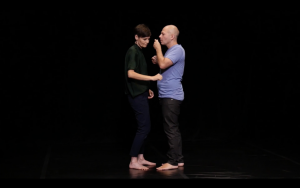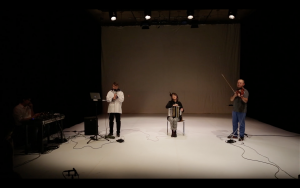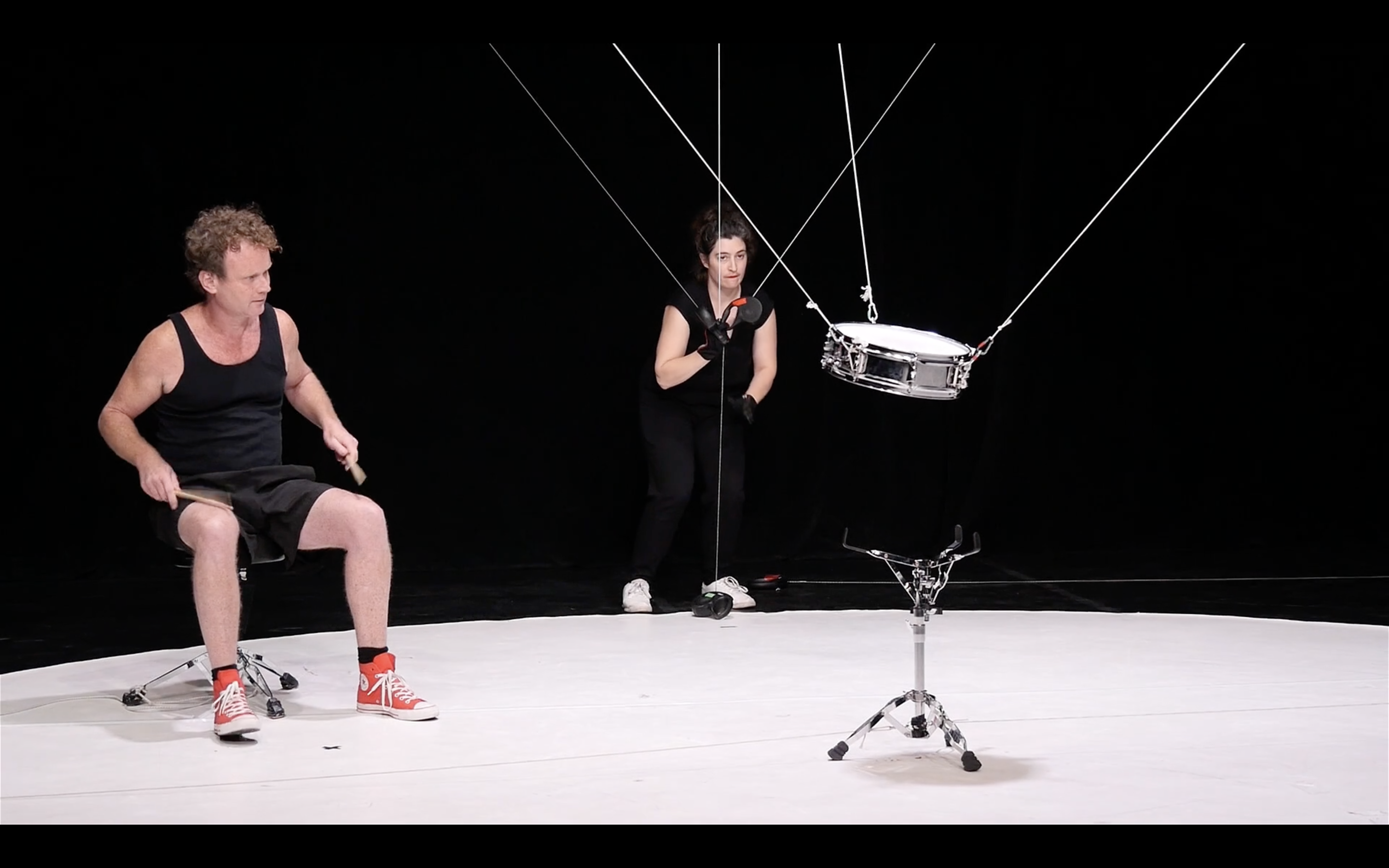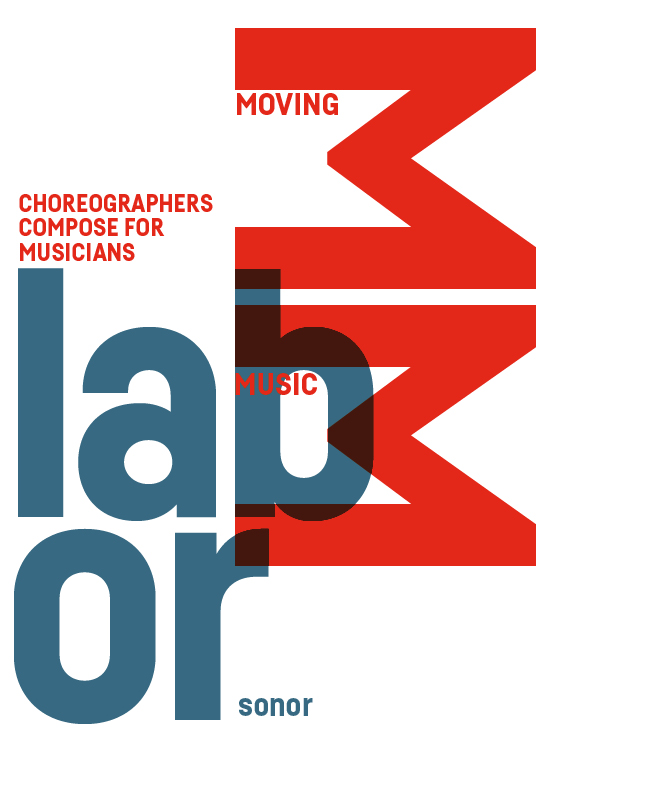What happens when choreography gives rise to music? What happens when choreographers compose?
The expansion of the concept of composition has shown that basically every sound can be understood as music. In the context of musical experimentation and experimental composing, it has become possible to use any object as a sound generator, to experience any sound-producing activity as music. The concept of choreography has undergone a similar expansion, understood as the organisation of movement in space and time. In this sense a wide array of theatrical means such as light, props and video, but also music as well as things that generate sound, can become objects of choreographic composition.
Against this backdrop, LABOR SONOR : MOVING MUSIC explores the specifics and affinities, the commonalities and differences between expanded concepts of composition and choreography. Six choreographers were invited to compose for musicians from in and around the Berliner Echtzeitmusik scene while developing choreographic perspectives on its musical aesthetics and practices.
In the Echtzeitmusik scene, the expansion of composition finds expression in a range of explicitly performative practices. The conscious perception of the sound in a space, a sense for the materiality of sound objects as well as for the bodies producing sound, led amongst other things to the intentional integration of gestures and actions as compositional material. These approaches offer multiple points of linkage to which concepts of expanded choreography can connect.
 Works have emerged that move beyond disciplines and that can be perceived both as dance and music. Looking farther than classical roles of composer and performing interpreter, these six collaborations reflect on the boundary-crossing practices of choreography and contemporary music. They show the immaterial, materialize the unhearable and listen to what remains hidden in scenarios of musical performance culture. These projects re-stage participating composer-performers’ routines and techniques while involving their personal styles, individualised sound languages and working modes as a part of the compositional process’s makeup.
Works have emerged that move beyond disciplines and that can be perceived both as dance and music. Looking farther than classical roles of composer and performing interpreter, these six collaborations reflect on the boundary-crossing practices of choreography and contemporary music. They show the immaterial, materialize the unhearable and listen to what remains hidden in scenarios of musical performance culture. These projects re-stage participating composer-performers’ routines and techniques while involving their personal styles, individualised sound languages and working modes as a part of the compositional process’s makeup.
 The festival LABOR SONOR : MOVING MUSIC sees itself as a space of negotiation for varying self-concepts and identities, as a zone for contact and conflict between artistic practices and forms of knowledge. Several questions that these six collaborations address overlap here: for all the divergence in practices of dance and music, can one find common ground on which to meet? What role do differences in corporeality and materiality, for example, play in choreography and experimental music? In what way could sound-generating movements already be choreography? How does choreography change in cooperation with musicians; how does music change under the conditions of its choreographic staging?
The festival LABOR SONOR : MOVING MUSIC sees itself as a space of negotiation for varying self-concepts and identities, as a zone for contact and conflict between artistic practices and forms of knowledge. Several questions that these six collaborations address overlap here: for all the divergence in practices of dance and music, can one find common ground on which to meet? What role do differences in corporeality and materiality, for example, play in choreography and experimental music? In what way could sound-generating movements already be choreography? How does choreography change in cooperation with musicians; how does music change under the conditions of its choreographic staging?
The symposium LABOR DISKURS : MOVING MUSIC transfers the festival’s questions into discussions that above all offer participating choreographers and musicians the occasion to raise their own questions, reflect on the collaborative work and talk about it with the audience. We expect to gain insight into reciprocal translations, transformations and reconfigurations; into negotiations of resistance and responsiveness, self-preservation and appropriation between choreographic and musical practice.
Matthias Haenisch, Christian Kesten, Andrea Neumann
friday 23.09.2016 16:30 SYMPOSIUM | 20:00
Nile Koetting composing for & with Annie Gårlid
Litó Walkey composing for & with Biliana Voutchkova
Antonia Baehr composing for & with Johnny Chang & Neele-Neo Hülcker & Lucie Vítková
saturday 24.09.2016 16:30 SYMPOSIUM | 20:00
Takako Suzuki composing for & with Robin Hayward
Fernanda Farah composing for & with Lucio Capece & Sabine Ercklentz
Clément Layes composing for & with Steve Heather & Anthea Caddy
BALLHAUS OST pappelallee 15 | 10437 berlin | u2 eberswalder str.
funded by Senatskanzlei Kulturelle Angelegenheiten Spartenübergreifende Förderung & Bezirksamt Pankow von Berlin Amt für Weiterbildung und Kultur Fachbereich Kunst und Kultur.


